#greatest mosque
Explore tagged Tumblr posts
Text

instagram
Ya Allah, I prayed to be called by You to visit Your Greatest House with my family, ALHAMDULILLAH you answered me prayer 🤍
Ya Allah, I prayed for the day I can be near The Kaaba walls and touch The Kaaba, ALHAMDULILLAH You answered my prayer 🤍
Ya Allah, I prayed for the day to sit in front of The Kaaba listening to the adhan, pray and cry my heart out, ALHAMDULILLAH You answered my prayer 🤍
Ya Allah, I pray You grant every muslim to visit Your Greatest House,
Ya Allah, I pray You invite us to come visit Your Greatest House again and again,
Ya Allah, I pray You call us to come perform Hajj so we may answer You with, “Labbaika, Allahumma Labaik”
Ya Allah, The Hearer and The Answerer of every prayers, I have no doubt You shall answer my prayers, Allahumma Ameen 🤍🤍
#makkah #masjidalharam #saudiarabia #familytravel #traveldairies #familytravelblogger #familyadventuretravel #contentcreator #beautifuldestination #travelbloggerlife #destination #wandermore #welovetravel #vacationwithfamily #traveltocreate #wanderfulplaces #makkahalmukarramah #umrah2023 #travelumrah #مكة #السعودية #مكةالمكرمة #kaabah #kaaba #haramain #islamicvideos
#travelmoments#travelmore#beautifuldestinations#makkah#places to visit#saudiarabia#travel#umrah 2023#vacation activities#vacation#makkahalmukarramah#visit mecca#mecca#saudi#sauditrends#umrah#islamic dua#holy place#greatest mosque#mosque#kaabah#kaaba#Instagram
7 notes
·
View notes
Photo
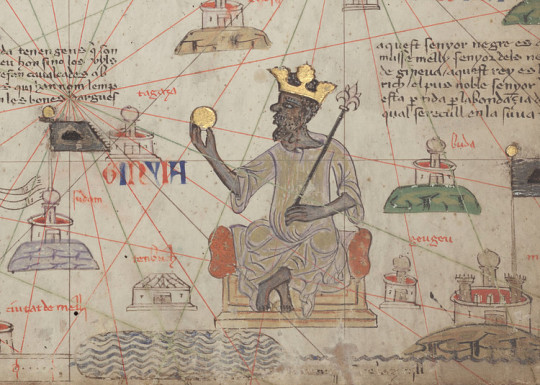
Mansa Musa I
Mansa Musa I was the ruler of the Mali Empire in West Africa from 1312 to 1337. Controlling territories rich in gold and copper, and monopolising trade between the north and interior of the continent, Mali grew extremely wealthy. Mansa Musa was said to have spent so much gold in Cairo that the value of bullion crashed by 20%.
A Muslim like his royal predecessors, Mansa Musa brought back architects and scholars from his pilgrimage to Mecca who would build mosques and universities that made such cities as Timbuktu internationally famous. Mansa Musa's 1324 stopover in Cairo, though, would spread Mali's fame even further and on to Europe where tall tales of this king's fabulous wealth in gold began to stir the interest of traders and explorers.
The Mali Empire
The Mali Empire (1240-1645), the largest and richest empire yet seen in West Africa, was founded by Sundiata Keita (aka Sunjaata, r. 1230-1255). The Mali capital was Niani, and the most important trading city was Timbuktu near the River Niger and located where major waterways and land routes converged. Immense wealth was gained from acting as a trade hub between the interior and southern coast of West Africa and North of Africa across the Sahara desert's caravan routes. Salt was a major commodity traded from the north while from the south came gold and ivory. The empire eventually included Ghana, Walata, Tadmekka, and the kingdom of Songhai and ultimately stretched all the way to the Atlantic coast. Indigenous rulers adopted Islam from their contact with Arab merchants, and the Mali Empire would thus play a significant part in the spread of Islam across West Africa. Locals, or at least urban ones, were converted, which created communities that then attracted Muslim clerics from the north, strengthening the religion's grip on the region. Local leaders would even perform pilgrimages to the Islamic holy sites like Mecca, including their greatest ever ruler, Mansa Musa.
Continue reading...
114 notes
·
View notes
Quote
Organized religion was the first and greatest protection racket, an economy of perpetual profit built on voluntary fear and coerced guilt. Donating money to churches, temples, mosques, synagogues, cults, et cetera, to help ensure a spot for one’s soul in the express elevator to that penthouse in the sky known as the afterlife was marketing genius!
Viet Thanh Nguyen, The Committed
35 notes
·
View notes
Text
NINE HOLOCAUST SURVIVORS COMPARE ZIONIST POLICIES TO THOSE OF THE NAZIS
“Sometime after [1956] I heard a news item about Israelis herding Palestinians into settlement camps. I just could not believe this. Weren’t the Israelis also Jews? Hadn’t we – they – just survived the greatest pogrom of our history? Weren’t [concentration] camps – often euphemistically called ‘settlement camps’ by the Nazis – the main feature of this pogrom? How could Jews in any measure do unto others what had been done to them? How could these Israeli Jews oppress and imprison other people? In my romantic imagination, the Jews in Israel were socialists and people who knew right from wrong. This was clearly incorrect. I felt let down, as if I was being robbed of a part of what I had thought was my heritage. …
I have to say to the Israeli government, which claims to speak in the name of all Jews, that it is not speaking in my name. I will not remain silent in the face of the attempted annihilation of the Palestinians; the sale of arms to repressive regimes around the world; the attempt to stifle criticism of Israel in the media worldwide; or the twisting of the knife labelled ‘guilt’ in order to gain economic concessions from Western countries. Of course, Israel’s geo-political position has a greater bearing on this, at the moment. I will not allow the confounding of the terms ‘anti-Semitic’ and ‘anti-Zionist’ to go unchallenged.”
Dr. Marika Sherwood, ‘How I became an anti-Israel Jew’, Middle East Monitor, 7/3/18. Marika Sherwood is a survivor of the Budapest ghetto.
-----
“Israel, in order to survive, has to renounce the wish for domination and then it will be a much better place for Jews also. The immediate analogy which a lot of people are making in Israel is Germany. Not only the Germany of Hitler and the Nazis but even the former German Empire wanted to dominate Europe. What happened in Japan after the attack on China is that they wanted to dominate a huge area of Asia. When Germany and Japan renounced the wish for domination, they became much nicer societies for the Japanese and Germans themselves. In addition to all the Arab considerations, I would like to see Israel, by renouncing the desire for domination, including domination of the Palestinians, become a much nicer place for Israelis to live.”
Dr. Israel Shahak, Middle East Policy Journal, Summer 1989, no.29. Israel Shahak was a survivor of the Warsaw ghetto and Bergen-Belsen concentration camp.
-----
“I am pained by the parallels I observe between my experiences in Germany prior to 1939 and those suffered by Palestinians today. I cannot help but hear echoes of the Nazi mythos of ‘blood and soil’ in the rhetoric of settler fundamentalism which claims a sacred right to all the lands of biblical Judea and Samaria. The various forms of collective punishment visited upon the Palestinian people – coerced ghettoization behind a ‘security wall’; the bulldozing of homes and destruction of fields; the bombing of schools, mosques, and government buildings; an economic blockade that deprives people of the water, food, medicine, education and the basic necessities for dignified survival – force me to recall the deprivations and humiliations that I experienced in my youth. This century-long process of oppression means unimaginable suffering for Palestinians.”
Dr. Hajo Meyer, ‘An Ethical Tradition Betrayed’, Huffington Post, 27/1/10. Hajo Meyer was a survivor of Auschwitz.
-----
“As a Jewish youngster growing up in Budapest, an infant survivor of the Nazi genocide, I was for years haunted by a question resounding in my brain with such force that sometimes my head would spin: ‘How was it possible? How could the world have let such horrors happen?’
It was a naïve question, that of a child. I know better now: such is reality. Whether in Vietnam or Rwanda or Syria, humanity stands by either complicitly or unconsciously or helplessly, as it always does. In Gaza today we find ways of justifying the bombing of hospitals, the annihilation of families at dinner, the killing of pre-adolescents playing soccer on a beach. …
There is no understanding Gaza out of context – Hamas rockets or unjustifiable terrorist attacks on civilians – and that context is the longest ongoing ethnic cleansing operation in the recent and present centuries, the ongoing attempt to destroy Palestinian nationhood.
The Palestinians use tunnels? So did my heroes, the poorly armed fighters of the Warsaw Ghetto. Unlike Israel, Palestinians lack Apache helicopters, guided drones, jet fighters with bombs, laser-guided artillery. Out of impotent defiance, they fire inept rockets, causing terror for innocent Israelis but rarely physical harm. With such a gross imbalance of power, there is no equivalence of culpability. …
And what shall we do, we ordinary people? I pray we can listen to our hearts. My heart tells me that ‘never again’ is not a tribal slogan, that the murder of my grandparents in Auschwitz does not justify the ongoing dispossession of Palestinians, that justice, truth, peace are not tribal prerogatives. That Israel’s ‘right to defend itself,’ unarguable in principle, does not validate mass killing.
Dr. Gabor Mate, ‘Beautiful Dream of Israel has become a Nightmare’, Toronto Star, 22/7/14. Gabor Mate is a survivor of the Budapest ghetto.
182 notes
·
View notes
Quote
The good procrastinator accepts the fact that she can’t get everything done, then decides as wisely as possible what tasks to focus on and what to neglect. By contrast, the bad procrastinator finds himself paralysed precisely because he can’t bear the thought of confronting his limitations. For him, procrastination is a strategy of emotional avoidance — a way of trying not to feel the psychological distress that comes with acknowledging that he’s a finite human being. The limitations we’re trying to avoid when we engage in this self-defeating sort of procrastination frequently don’t have anything to do with how much we’ll be able to get done in the time available; usually, it’s a matter of worrying that we won’t have the talent to produce work of sufficient quality, or that others won’t respond to it as we’d like them to, or that in some other way things won’t turn out as we want. The philosopher Costica Bradatan illustrates the point by means of a fable about an architect from Shiraz in Persia who designed the world’s most beautiful mosque: a breathtaking structure, dazzlingly original yet classically well proportioned, awe-inspiring in its grandeur yet wholly unpretentious. All those who saw the architectural plans wanted to buy them, or steal them; famous builders begged him to let them take on the job. But the architect locked himself in his study and stared at the plans for three days and nights — then burned them all. He might have been a genius, but he was also a perfectionist: the mosque of his imagination was perfect, and it agonised him to contemplate the compromises that would be involved in making it real. Even the greatest of builders would inevitably fail to reproduce his plans absolutely faithfully; nor would he be able to protect his creation from the ravages of time — from the physical decay or marauding armies that would eventually reduce it to dust. Stepping into the world of finitude, by actually building the mosque, would mean confronting all that he couldn’t do. Better to cherish an ideal fantasy than to resign himself to reality, with all its limitations and unpredictability. Bradatan argues that when we find ourselves procrastinating on something important to us, we’re usually in some version of this same mindset. We fail to see, or refuse to accept, that any attempt to bring our ideas into concrete reality must inevitably fall short of our dreams, no matter how brilliantly we succeed in carrying things off — because reality, unlike fantasy, is a realm in which we don’t have limitless control, and can’t possibly hope to meet our perfectionist standards. Something — our limited talents, our limited time, our limited control over events, and over the actions of other people — will always render our creation less than perfect. Dispiriting as this might sound at first, it contains a liberating message: if you’re procrastinating on something because you’re worried you won’t do a good enough job, you can relax — because judged by the flawless standards of your imagination, you definitely won’t do a good enough job. So you might as well make a start.
Oliver Burkeman, Four Thousand Weeks
282 notes
·
View notes
Text
definitely a longer piece so these excerpts are far from showcasing everything this piece has to offer! read the whole thing on your own time, and in general, just check out jewish currents, an educational, leftist, anti-zionist jewish magazine!
Every August, the township of Edison, New Jersey—where one in five residents is of Indian origin—holds a parade to celebrate India’s Independence Day. In 2022, a long line of floats rolled through the streets, decked out in images of Hindu deities and colorful advertisements for local businesses. People cheered from the sidelines or joined the cavalcade, dancing to pulsing Bollywood music. In the middle of the procession came another kind of vehicle: A wheel loader, which looks like a small bulldozer, rumbled along the route bearing an image of Indian Prime Minister Narendra Modi aloft in its bucket. For South Asian Muslims, the meaning of the addition was hard to miss. A few months earlier, during the month of Ramadan, Indian government officials had sent bulldozers into Delhi’s Muslim neighborhoods, where they damaged a mosque and leveled homes and storefronts. The Washington Post called the bulldozer “a polarizing symbol of state power under Narendra Modi,” whose ruling Bharatiya Janata Party (BJP) is increasingly enacting a program of Hindu supremacy and Muslim subjugation. In the weeks after the parade, one Muslim resident of Edison, who is of Indian origin, told The New York Times that he understood the bulldozer much as Jews would a swastika or Black Americans would a Klansman’s hood. Its inclusion underscored the parade’s other nods to the ideology known as Hindutva, which seeks to transform India into an ethnonationalist Hindu state. The event’s grand marshal was the BJP’s national spokesperson, Sambit Patra, who flew in from India. Other invitees were affiliated with the Hindu Swayamsevak Sangh (HSS), the international arm of the Hindu nationalist paramilitary force Rashtriya Swayamsevak Sangh (RSS), of which Modi is a longtime member.
...
On December 6th, 1992, a mob of 150,000 Hindus, many of whom were affiliated with the paramilitary group the RSS, gathered at the Babri Masjid, a centuries-old mosque that is one of the most contested sacred sites in the world. Over the preceding century, far-right Hindus had claimed that the mosque, located in the North Indian city of Ayodhya, was built not only upon the site where the Hindu deity Ram was born but atop the foundations of a demolished Hindu temple. The RSS and its affiliates had been campaigning to, in the words of a BJP minister, correct the “historical mistake” of the mosque’s existence, a task the mob completed that December afternoon. “They climbed on top of the domes and tombs,” one witness told NPR. “They were carrying hammers and these three-pronged spears from Hindu scripture. They started hacking at the mosque. By night, it was destroyed.” The demolition sparked riots that lasted months and killed an estimated 2,000 people across the country.
The destruction of the Babri Masjid was arguably Hindu nationalism’s greatest triumph to date. Since its establishment in 1925, the RSS—whose founders sought what one of them called a “military regeneration of the Hindus,” inspired by Mussolini’s Black Shirts and Nazi “race pride”—had been a marginal presence in India: Its members held no elected office, and it was temporarily designated a terrorist organization after one of its affiliates shot and killed Mohandas Gandhi in 1948. But the leveling of the Babri Masjid activated a virulently ethnonationalist base and paved the way for three decades of Hindutva ascendance. In 1998, the BJP formed a government for the first time; in 2014, it returned to power, winning a staggering 282 out of 543 seats in parliament and propelling Modi into India’s highest office. Since then, journalist Samanth Subramanian notes, all of the country’s governmental and civil society institutions “have been pressured to fall in line” with a Hindutva agenda—a phenomenon on full display in 2019, when the Supreme Court of India awarded the land where the Babri Masjid once stood to a government run by the very Hindu nationalists who illegally destroyed it. (Modi has since laid a foundation stone for a new Ram temple in Ayodhya, an event that a prominent RSS activist celebrated with a billboard in Times Square.) The Ayodhya verdict came in the same year that Modi stripped constitutional protections from residents of the Muslim-majority region of Kashmir and passed a law that creates a fast track to citizenship for non-Muslim immigrants, laying the groundwork for a religious test for Indian nationality. Under Modi, “the Hinduization of India is almost complete,” as journalist Yasmeen Serhan has written in The Atlantic.
To achieve its goals, the RSS has worked via a dense network of organizations that call themselves the “Sangh Parivar” (“joint family”) of Hindu nationalism. The BJP, which holds more seats in the Indian parliament than every other party combined, is the Sangh’s electoral face. The Vishwa Hindu Parishad (VHP) is the movement’s cultural wing, responsible for “Hinduizing” Indian society at the grassroots level. The Bajrang Dal is the project’s militant arm, which enforces Hindu supremacy through violence. Dozens of other organizations contribute money and platforms to the Sangh. The sheer number of groups affords the Sangh what human rights activist Pranay Somayajula has referred to as a “tactical politics of plausible deniability,” in which the many degrees of separation between the governing elements and their vigilante partners shields the former from backlash. This explains how, until 2018, the CIA could describe the VHP and Bajrang Dal as “militant religious organizations”—a designation that applies to non-electoral groups exerting political pressure—even as successive US governments have maintained a warm relationship with their parliamentary counterpart, the BJP.
...
The most extreme figures in the Hindu nationalist and Zionist movements were especially frank about the nature of their partnership: “Whether you call them Palestinians, Afghans, or Pakistanis, the root of the problem for Hindus and Jews is Islam,” Bajrang Dal affiliate Rohit Vyasmaan told The New York Times of his friendly relationship with Mike Guzofsky, a member of a violent militant group connected to the infamous Jewish supremacist Meir Kahane’s Kach Party.
...
In 2003, Gary Ackerman—a Jewish former congressman who was awarded India’s third-highest civilian honor for helping to found the Congressional Caucus on India—told a gathering of AJC and AIPAC representatives and their Indian counterparts that “Israel [is] surrounded by 120 million Muslims,” while “India has 120 million [within].” Tom Lantos, another Jewish member of the caucus, likewise enjoined the two communities to collaborate: “We are drawn together by mindless, vicious, fanatic, Islamic terrorism.”
#reaux speaks#hindutva#nationalism#islam#religion#india#narendra modi#south asia#muslim#new jersey#Bharatiya Janata Party#history#resources#jewish currents#anti zionism#palestine#islamophobia#afghanistan#hindu#jewish#free palestine#israel
164 notes
·
View notes
Text
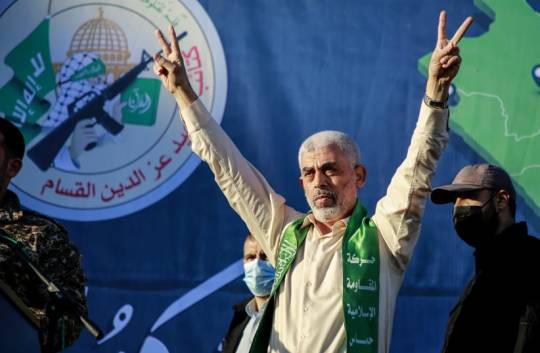
🟢 Martyr Izz El-Din Al-Qassam Brigades:
—
In the name of Allah, the Most Gracious, the Most Merciful
"And do not consider those who have been killed in the cause of Allah as dead; rather, they are alive with their Lord, receiving provision."
O sons of our struggling Palestinian people...
O masses of our Arab and Islamic nation:
The Martyr Izz El-Din Al-Qassam Brigades exalts the ascension of the great martyr leader Yahya Sinwar "Abu Ibrahim", leader of the Islamic Resistance Movement Hamas, who ascended, advancing and not retreating, in the most honorable of battles in defense of the blessed Al-Aqsa Mosque and our people and their legitimate rights. It is a source of pride for our movement to present leaders before soldiers, and for its leaders to lead the convoy of martyrs of our people who gave their lives and blood for the sake of Allah and on the path to liberating Palestine, and for its leader to be martyred among his fighting brothers, a hero engaged in combat with the invaders who thought that Gaza could be an easy prey for their cowardly army.
The journey of our leader, Abu Ibrahim, was an honorable jihadist journey, during which he was from the founding generation of the Islamic Resistance Movement, Hamas, and its military and security apparatuses. He sacrificed the prime of his youth as a prisoner in the occupation’s prisons for more than twenty years before he was released with his head held high in the “Loyalty of the Free" deal. Once he was released from prison, he insisted on continuing the journey of jihad, refusing to rest. He supervised the movement’s military work in the three regions and had an important role in the path of unifying the resistance fronts on the road to Al-Quds. Then he headed the Movement in Gaza, and his leadership period constituted a qualitative shift in its advocacy, political and military journey that culminated in Al-Aqsa Flood and in the path of national relations and joint resistance work. He later led the movement at home and abroad following the martyrdom of the great leader Ismail Haniyeh.
When the resistance factions, with Hamas at the forefront, decided to enter this major, decisive battle in the history of the Palestinian people's struggle and our nation's journey, they knew the price of liberation was very high, a price all nations paid before freeing themselves from their occupiers. They were ready to lead the ranks of the sacrificers, offering both leaders and soldiers, refusing to submit to the enemy or remain silent about its oppression and theft of our people's legitimate rights. Our jihad will not cease until Palestine is liberated, the last zionist is expelled, and all our legitimate rights are restored. The greatest proof is that after a year of the Al-Aqsa Flood battle, our people have neither broken nor surrendered, despite the immense costs and the brutal genocidal crimes of the zionist entity.
This criminal enemy is delusional if it thinks that by assassinating the great leaders of the resistance such as Sinwar, Haniyeh, Nasrallah, Al-Arouri and others, it can extinguish the flame of the resistance or push it to retreat. Rather, it will continue and escalate until the legitimate goals of our people are achieved. Martyrdom is the highest thing our leaders desire, and their blood will be a beacon that lights the path to liberation and a fire that burns the aggressors. Our leaders have left behind hundreds of thousands of fighters from our people and our nation who are determined to confront the zionist occupation until Palestine and Al-Aqsa Mosque are cleansed of its filth and it is swept away from our land, Allah willing.
Indeed, it is a jihad of victory or martyrdom.
Martyr Izz El-Din Al-Qassam Brigades - Palestine
Friday 15 Rabi' al-Thani 1446 AH corresponding to 18/10/2024 AD
23 notes
·
View notes
Text
We got a super interesting שיחה in school yesterday. They brought in an ex Muslim who converted to Judaism.
He started by telling us what his childhood was like, horrific shit let me tell you.
He explained how women are treated, and how they literally have no rights.
He explained how they would get beatings for being "disrespectful." He explained how if you were a "bad kid" like he was, you would get beaten. He said that he wanted to understand, so he would ask questions like "why do they have to pray at the mosque, why not just pray at home?" He said he got slapped for asking.
He talked about his sister, who was also disrespectful, he said that she got fed up, refused to do a chore or something and she got severely beaten. He told us how she would get beaten worse than anything we could imagine. He talked a bit more about how they treated his sister.
Then he told us how one day she convinced his brothers and father to let her get a job, (and give them all the money of course) and they let her.
One day she came back home a bit late, her brother's asked her why she was home late, and she explained how her friend took her to a shopping mall. Aperiently in Islam girls going to malls is illegal or something so they fucking killed her. (the reason was that she had supposedly dishonored the family, but omfg that's horrible.)
The guy explained how he was in his shared room with the rest of his brothers, he heard screaming, and his sister pleading for her life, and then pure silence.
He said that his brother opened the door, and before him was a gruesome sight he would never forget.
He was 9 years old or younger at the time btw.
So after that whole incident, his family decided to send him to study in a boarding school in Gaza. (I don't remember the name, I'm terrible with names.) Anyways, so he explained that he walked in and immediately he noticed that there were no tables or chairs. Later when he came to the sleeping quarters he realized there were also no beds. He inquired why, and was met with shock, confusion and some shitty explanation about how Muslims must be as close to the earth as possible or something like that.
So the way the school worked was that they study the Koran all day from 7:00 to 23:00 and then they sleep. He talked about how talking was forbidden and that you would get severely beaten at best if you were caught uttering a word. He than mentioned how he knew people who had lost their lives over a sentence.
When he was 12 and a half he was called to the principal's office, aperiently they thought he was "ready" something something that I didn't quite catch, ummm they taught them that Jews are the ultimate evil, that the greatest thing they could ever do would be to kill a Jew. Aperiently they were taught that killing a Jew would secure their place in heaven.
He explained that Muslims are willing to die to kill a Jew, cause if they die killing a Jew they are automatically going to heaven.
He said that he remembered that back home they would sometimes work with Jews, so he asked if it's ok to help a Jew. Like an elderly Jew or something. He was beaten until he couldn't walk for simply suggesting such a thing.
After that he was a bitch to the teacher again, he got beat and then they said they were sending him off. He was happy cause he thought he was being sent home, but turns out they were just sending him. To a different branch of the same school.
Once he arrived he immediately started hatching an escape plan.
He made a rule for himself that he would only ask each person 1 question.
Eventually he figured it out, hopped in a taxi or bus (I don't remember sorry) and made his way back home. The first thing he saw was his mother, who wouldn't even look at him because his brothers were nearby.
His brothers saw him, yelled at him said that he and the school would regret letting him come home ect. He said that he looked at his older brother and told him that he isn't the little 9 year old he was when they sent him off, they didn't know what he'd been through, and that he came home so he could be home and there was nothing they could do about it. And he reminded them of what they did to their sister, and said that he would tell the cops.
The brother raged something something (sorry I have a shit memory) eventually they decided to let him stay home, but he could not leave the house, and he had to do all the chores and probably something else im forgetting. They said that if he disobeyed what they did to their sister would seem miniscule in comparison to what they would do to him.
He decided that he would escape the moment he got the chance. And after 2 weeks, he got his chance. One of his brothers left the house key in his pocket, he pickpocketed him, unlocked the door in the middle of the night and ram away.
He knew that his family would be looking for him, waiting to kill him, so he hid in a graveyard for 10 days.
At some point he left to go look for scrap's, when he came across some Jew who had a baguette. He weighed his options and eventually decided that food came before the morals he's been taught.
So he approachs the Jew, and asks him if he speaks Arabic (in Arabic obviously) and the Jew says he does (In Arabic of course.) so he tells him that his brothers killed his sister, and their going to kill him too and can he pleaseee have some food.
The guy thinks he's pulling his leg, tells him to get lost something something the guy gets convinced and gives him some food and water.
Eventually (I don't remember what happened sorry) he ends up driving him to the central bus station in tel Aviv, hands him some money, and directs him to a bus, tells him to get off in Eilat, he says that what Eilat is, the guy tells him to get off where everyone gets off.
The bus was full of idf soldiers so it was very awkward and probably scarry for this guy to be on that bus.
He gets off where everyone gets off, lives on the streets for a while, until some guy who was also on the streets (they saw each other everyday,) approachs him to ask him what his deal is the guy doesn't understand Hebrew, so turns out this guy is fluent in Arabic. They talk the guy explains his deadly situation and this guy tells him that he has a brother who's could get him into a boarding school.
Now, a boarding school?! Boarding schools are awful! Remember what it was like!?? Hell no! So he obviously declines the offer, but this guy is persistent. So eventually he agrees, he goes this guy becomes like a father figure to him, reminder he's like 14-15 ish at this time.
So this guy takes him in, he's In shock, food water a roof for free??? Omg awesome! So he goes to this school, he learns Hebrew and life is good. But now his 18th birthday is approaching and he decides he wants to join the army. So he tells the guy, and other people in charge who kindly tell him can't but he explained how the more people explained why he couldn't he grew more and more convinced he could.
Eventually, this one guy in charge gets tired of this and tells him that if he can get his parents to sigh a permission slip he can. So naturally, his family will kill him if he shows up, so he tells this guy something like he should take to his parents without dying and something something he ends up being allowed to join.
Around this part we ran out of time so yeah.
I really feel like this guy's life story is important to share especially right now with everyone glorifying Islam and all that.
Islam is a religion built on murder. Kabam I'm tired sorry for the long post.
43 notes
·
View notes
Note
okay i know that you said you're not the greatest history buff, but i realy wanted to know your take on the Safavid kingdom as a representation of a middle eastern community..? if you've read enough manhwas you probably have seen some stupid stereotypes and it realy sucks. god i feel like i'm bothering you asking this i mean we don't know much about safavid .. you don't have to answer this :D
of course! i'll try my best to speak about it! the floor is also open to anyone who has their own additions!
So. We all know that ASM borrows inspiration from existing territories and conflict from the 1700s all the way up to the late 1800s, right? Well get ready for this.
If we use this same research model, we'll come to find that the Safavid Dynasty also existed in Iran back in the 16th century. Which means we have a direct reference point we can compare the (manhwa) Safavid Kingdom to! (just remember to take it with a few grains of salt. We're dealing with 400+ years of history here!)
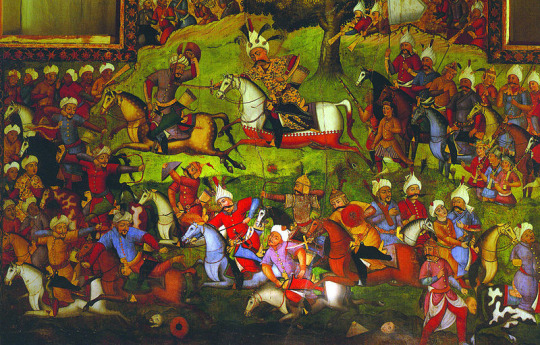
In my humble opinion (as someone who isn't part of the middle-eastern community btw), I feel like ASM does a pretty fair job at representing the middle east via Safavid/Pasha Family. The biggest hurdle just comes from the fact we haven't seen much of them yet.
The first thing I noticed was the architecture. During Halima's trip back home to Safavid we get to see ORKA's depiction of the Kingdom. As you can see below, the inspiration behind the Bahjat's Palace is pretty directly linked to the Meidan Emam in Isfahan, a royal mosque from the Safavid Era!

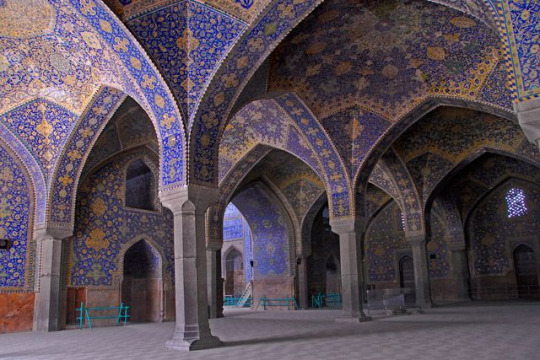

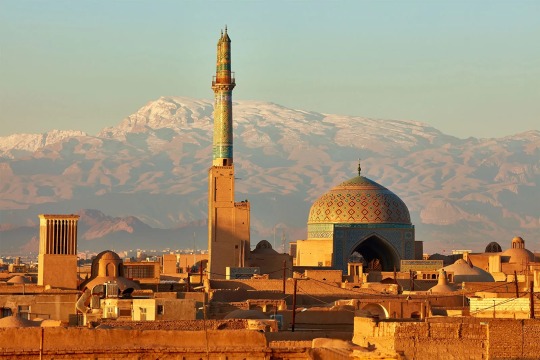
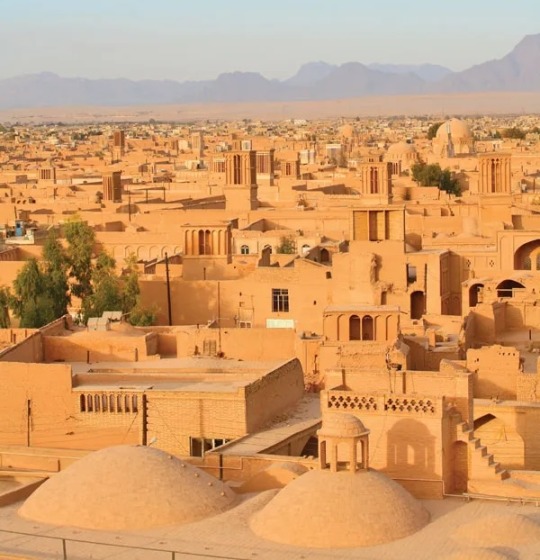
Unfortunately, the establishing shot of the city isn't as easy to compare, with the introduction of modern architecture. But if we look at Yazd, an untouched city in Iran, we can see the traces of inspiration with just a few minor discrepancies: minaret, domed mosques, earthen town houses.
We also get these small fleeting moments that really make the characters feel like they're from another country. For example, Nasir, Ali's escort can be seen wielding a curved sword as opposed to a European broadsword. Later, Nora mentions that it is a shamshir, a type of Persian scimitar.

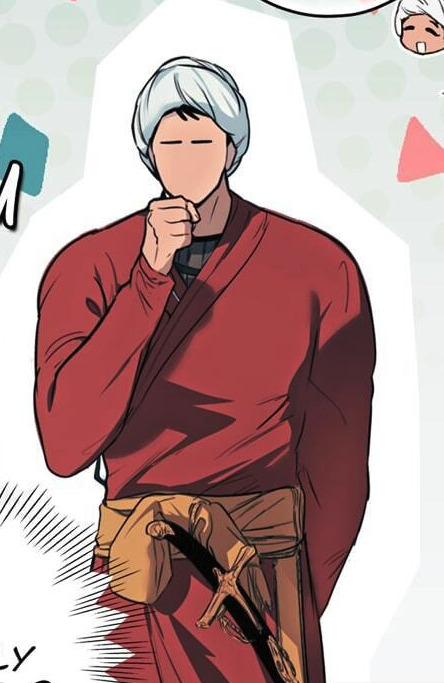

even these small details really make for great world building. Honestly, I'd love to see these props make a comeback in future scenes. Like can you imagine seeing one of the rugs Ali brought in the Neuschwanstein Castle?
Now to finally get to the part you've probably been waiting for. The clothes.

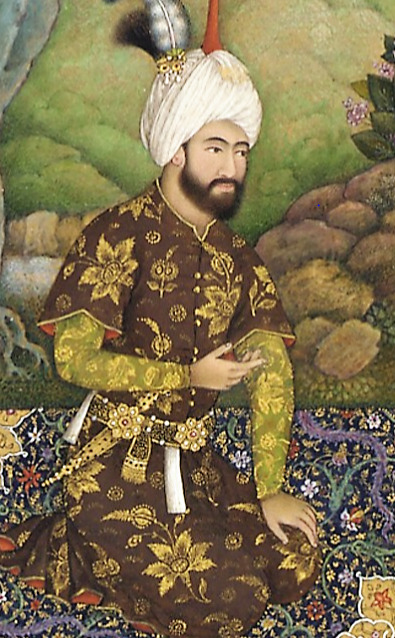
Unfortunately, I'm not as well versed in royal fashion in the Middle East so I had a hard time identified the style of dress.
When we compare the real Shahs of the Safavid Dynasty, we'll see that their fashion of choice changed greatly over the course of the ruling. I couldn't pinpoint exactly who, when or which specific culture ORKA is referencing here. But we do see some elements from Tahmasp I (feathered turban, ornate belt, embroidered textiles). Please correct me if I've made any errors here. I'm totally not confident in my Middle Eastern fashion history.
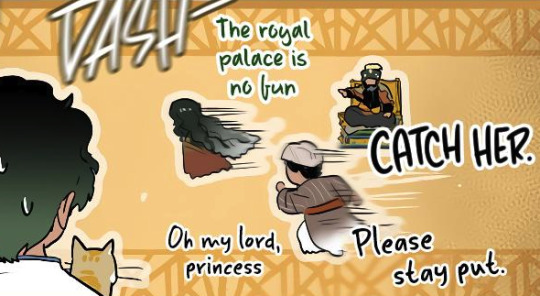
But above all else, I really just enjoy how the Pasha family is written and designed. I think we've seen stereotypes in all forms of media where middle easterners are portrayed... not so well.
In ASM, they're just the Pashas. As a foreign kingdom, they pose a threat against the Empire, but they're not evil. The King seems to be as tired with Halima's bullshit as the Empress is with Theo. Even Nasir has his own occasional dialogue, exasperated by Ali's behavior. And if you've read the same comics I have, we're all too familiar with the "dangerous and stoic middle-easterner" stereotype.
IMO, we've seen "foreign" characters in manga/manhwa that are usually boiled down to one of three types: the socially insensitive clowns/perverts, the murderer, or the alien that somehow has white skin and hair. but I personally find it a breath of fresh air how ASM leans full into the concept of darker skinned characters with dark hair and actual rounded personalities.
This shouldn't be such a high bar to reach, but ORKA has one again reached it.
#a stepmother's marchen#the fantasie of a stepmother#ali pasha#halime pasha#stepyapping#askstepmarchen
34 notes
·
View notes
Note
Assalamualaikum Warahmatullah..
I just got divorced after 4 years of marriage, my husband left on the grounds that he no longer loves me. Is it because I'm not beautiful or because I haven't given him children. I don't know, I can't find an answer why he doesn't love me anymore. I am not satisfied with this separation, I am down, I am broken, I am sick, I am damaged.
I am not confident in my widowhood, I am ashamed. As if they will look very sharply cynical towards me.
I am afraid to go to campus to continue my master's education, I am afraid to go to school to teach, I am afraid to meet my recitation friends. It's been 2 years since I locked myself in the house.
Why Allah has the heart for me, I'm sure. During my time as a wife, I was obedient to my husband.
Why did Allah take away the love in my husband's day, while Allah did not also take away this love for my husband.
Isn't this unfair? My Hindu friend invited me to convert, saying that God will heal me.
Help me, what should I do?
Wa Alaikumussalam
This is a big mistake, my sister. Allah, who created us, knows best what is good for us.
Perhaps there is good in this separation for you. Perhaps if your marriage had continued longer than this, it would have become a miserable marriage. Some people live in miserable marriages and are unable to divorce.
You have two choices: either you can live feeling miserable, worried and anxious, or you can bear it with patience and seek reward, in the hope of attaining reward and rising in status. Your sorrow will neither advance you nor put you back, as the Prophet (peace and blessings of Allaah be upon him) said: “The greatest reward comes with the greatest trial. When Allaah loves a people He tests them. Whoever accepts that wins His pleasure but whoever is discontent with that earns His wrath.” Narrated by al-Tirmidhi, 2396; Ibn Maajah, 4031; classed as saheeh by al-Albaani in Saheeh al-Tirmidhi.
It is just an experiment and it will pass and you may find a better marriage than this and another better husband. You gave your best and were an obedient wife to your husband and for this you will have a great reward from Allah because you have fulfilled your duty.
Look at the history of the women of the Companions, many of them got divorced and it did not affect their deen because they knew that it was Allah’s will, and the experiment passed and they looked for a better marriage.
It is normal to go through a period of sadness after the divorce, but for it to continue for this long is not right and you must overcome it.
Go to the mosque and try to meet good women and don't be alone. Perhaps there is a good man looking for a good wife who is you. No one will look at you in a strange way.
This is an incorrect illusion. Divorce is permissible and happens to many people. You should deal with people easily and there is no problem.
Filling your time with things that will bring benefit in this world and in the Hereafter. For example, you could join a centre that teaches memorization of the Holy Qur’an, attend religious lectures, read useful books, learn useful domestic skills such as sewing, and so on.
16 notes
·
View notes
Text

MWW Artwork of the Day (2/8/25) Ottoman Empire (Turkish, 15th-20th c.) Interior: Sultan Ahmed Mosque ("Blue Mosque")(1609-16) Istanbul, Turkey
The upper levels of the interior of this mosque are dominated by blue paint. More than 200 stained glass windows with intricate designs admit natural light, today assisted by chandeliers. On the chandeliers, ostrich eggs are found that were meant to avoid cobwebs inside the mosque by repelling spiders. The decorations include verses from the Qur'an, many of them made by Seyyid Kasim Gubari, regarded as the greatest calligrapher of his time. The floors are covered with carpets, which are donated by faithful people and are regularly replaced as they wear out. The many spacious windows confer a spacious impression. The casements at floor level are decorated with opus sectile.
8 notes
·
View notes
Text




For four things Cordoba surpasses all cities:
Its bridge and its mosque (that's two)
and Medina Azahara is the third.
The fourth and greatest thing is knowledge.
—Abū Muḥammad ibn ʿAṭiyya (Andalus, d. 1147)
10 notes
·
View notes
Text
🇵🇸 🚨
MESSAGE FROM THE COMMAND NODES OF THE AL-QUDS BRIGADES
📹 Training and equipping scenes from the command nodes of the Al-Quds Brigades, belonging to Palestinian Islamic Jihad (PIJ), with a message to the Palestinian people.
"Greetings to our people in the Gaza Strip who are facing the treacherous Zionist enemy," the message begins.
"With their bare chests and their intense resistance, we say to them... do not weaken and do not grieve."
The message continues, "for you are superior if you are believers."
"The men of the Al-Quds Brigades, are still on the [battle]field, continuing day and night, disturbing the enemy's sleep, with all their might, determination and certainty."
"To our people in the West Bank, the land of Tawlabah, Al-Omari, and Al-Nabulsi: Happy New Year, may our dear Jerusalem be well every year, and it's people, the guardians of Al-Aqsa Mosque, and a thousand blessings to you."
"Peace, mercy and blessings of Allah be upon you. Allah is the Greatest!"
"And to Allah belongs all Praise."
#source
@WorkerSolidarityNews
#al quds brigades#palestinian islamic jihad#palestinian resistance#the resistance#resistance#islamic resistance#resisting occupation#axis of resistance#palestine#palestine news#palestinians#free palestine#free gaza#gaza#gaza news#war in gaza#gaza conflict#israel palestine conflict#politics#news#geopolitics#world news#international news#global news#war#breaking news#israel#current events#israeli occupation#israeli occupation forces
23 notes
·
View notes
Text
Israel reaps what they sow
Kamala calling Iran a "destabilizing force in the Middle East" is fucking laughable.
While the U.S have bombed Iraq, Iran, Yemen, Syria, Lebanon, and Afghanistan. Not to mention what Hillary and Obama did to fucking Libya.
And the U.S funded and armed Israel's genocide of Palestine.
This wasn't an unprovoked attack. This wasn't "unfair" to Israel. This was exactly what they deserved. Turns out there are consequences for bombing and trying to invade your neighbors. How about that? Turns out if you fuck around, you find out.
Israel bombed Gaza for a year, starves civilians and destroys infrastructure amounting to genocide, ethnic cleansing in West Bank, bombs Iranian consulate, carries out assassination in Iran, bombs Syria and Yemen, bombs and invades Lebanon.
You cannot seriously tell me that after bombing 4 countries while carrying out an ethnic cleansing, that Israel is the victim.
You reap what you fucking sow.
"We pray for Israel" "We stand with Israel"
No. I stand with Palestine. I stand with Lebanon. I stand with Israel's victims. Victims, that YOU helped kill. Fuck Joe Biden and fuck Kamala Harris.
All of this was predictable and preventable. The Biden admin made an active choice to allow it to escalate to this point. His legacy and her eventual legacy is genocide and pointless war. This is what he will be remembered for. A war with Iran for the sole sake of protecting Israel's right to wipe Gaza from the map and massacre Palestinians.
All you had to do was stop arming them. Stop funding them and learn to say no to that fucking genocidal dipshit Netanyahu. If fucking Ronald Reagan and Bush told Israel when enough was fucking enough, what does that say about you?
You don't get to play victim when you bomb schools. You don't get to play victim when you bomb Mosques, Churches, Synagogues, hospitals, homes, refugee camps and the birthplace of JESUS FUCKING CHRIST ON CHRISTMAS DAY and have the fucking gall and the fucking nerve to say YOU'RE the victim.
Fuck Israel....FUCK ISRAEL! Fuck Netanyahu. Fuck Trump. Fuck Biden. Fuck Kamala Harris and fuck America for constantly funding and arming these murderous genocidal fucks and for letting them plunge the world in a war that they cannot hope of escaping.
I am tired of the rich and powerful, the people who are in charge playing god. I am tired of seeing mutilated children, dead families, pieces of human remains being pulled out of the rubble. I am tired of a genocide being funded instead of actually HELPING the American people.
Infrastructure is failing on purpose. Healthcare is shitty on purpose. Schools are prisons with little learning/socialization on purpose. Industries are deregulated on purpose. Cop cities are being built on purpose. But boy do we have enough fucking money to fund a genocide and fund the police to brutalize us! Why is our government spending more to make war overseas than to help our own people?
What has Israel ever done for America in return? How much foreign aid do you think they'll us for the Hurricane Helene victims? I don't think I've ever seen or heard America's "greatest ally" ever helping us in return for us funding their war crimes.
I am tired of paying for Israel's war, greed and genocide.
When President Joe Biden was asked if there’s any more resources that the federal government could be providing hurricane victims, he said:
“No. We’ve given them … a significant amount even though they didn’t — hadn’t — asked for it.”
BULLSHIT! They gave Israel $8.7 billion while saying hurricane victims have enough money. Why is it whenever Americans are in dire need of aid and help, OUR OWN FUCKING GOVERNMENT WOULD RATHER WE FUCKING SUFFER THAN GIVE US THE MONEY WE NEED AND GIVE THAT FUCKING MONEY TO FUCKING ISRAEL???? They value Israel’s continued destruction of Palestine over their own people and I am fucking sick of this shit.
Everything that's happening now is a direct result of the Biden-Harris administration's refusal to cut off weapons to Israel as they were flattening Gaza. Now they're about to start a full-blown regional war because Kamala Harris and Joe Biden refused to rein them in.
Failures.
Fuck every one of these genocidal maniacs and I hope they all get what's coming to them. You reap what you sow.
#Free Palestine#Palestine#Lebanon#Iran#Anti Israel#Anti Zionism#Amerikkka#Anti Biden#Anti Trump#Anti Kamala Harris
16 notes
·
View notes
Text
The Life of The Prophet Muhammad(pbuh): The Miracles of The Prophet Muhammad (PBUH)
The Miracle of Isra (Night Journey) and Miraj (Ascension)
Part. 1
One of the greatest miracles of the Prophet is the miracle of Night Journey (Isra) and Ascension (Miraj), which is mentioned and narrated by the Quran, authentic hadith resources and history resources. First, we will explain how the miracle of Night Journey and Ascension took place quoting from the verses of the Quran, hadiths and narrations from authentic resources; then, we will give answers to the questions that can come to the mind regarding the issue.
Lexically “isra” means walking at night, traveling at night, “miraj” means rising, going up to a high place. The events of Night Journey and Ascension took place on the twelfth year of the prophethood of Hazrat Muhammad (pbuh) in Makkah.
The event took place as follows in brief: On the 27th night of the month of Rajab, acting upon the call from God Almighty and guided by Gabriel (Jibril), the Prophet (pbuh) went from the Kaaba in Makkah to Masjid al-Aqsa in Jerusalem and then to the sky, to the high realms and to the presence of God.
It is stated in the chapters of al-Isra and an-Najm in the Quran how the miracle of Night Journey and Ascension took place. The verses regarding the issue are as follows:
“Glory to (Allah) Who did take His Servant for Journey by night from the Sacred Mosque to the Farthest Mosque whose precincts We did bless― in order that We might show him some of Our Signs: for He is the one Who heareth and seeth (all things).”
“While he was in the highest part of the horizon: Then he approached and came closer, And was at a distance of but two bow-lengths or (even) nearer; So did (Allah) convey the inspiration to His Servant (conveyed) what He (meant) to convey. The (Prophet’s) (mind and) heart in no way falsified that which he saw. Will ye then dispute with him concerning what he saw? For indeed he saw him at a second descent. Near the Lote-tree beyond which none may pass: Near it is the Garden of Abode. Behold, the Lote-tree was shrouded (in mystery unspeakable!) (His) sight never swerved nor did it go wrong! For truly did he see of the Signs of his Lord the Greatest!.”
How did the Ascension take place?
Hazrat Prophet (pbuh) went fromthe Kaaba (Makkah) to Masjid al-Aqsa (Jerusalem) on a Paradise animal similar to a horse called Buraq.Before he reached Jerusalem, he stopped by the place of Hazrat Moses (pbuh) and performed a two-rak’ah prayer there;then, he reached Masjid al-Aqsa. There, he was met by a group of prophets among which there were Jesus (Isa), Moses (Musa) and Abraham (Ibrahim).Hazrat Muhammad (pbuh) led the other prophets in a prayer of two-rak’ahs.
After that, the Prophet (pbuh) was brought two bowls; one of them had wine and the other had milk. He was told, “Have either of them!“ The Prophet (pbuh) chose the milk. Jibril said to the Prophet (pbuh), "You chose the natural one; if you had chosen the wine, your ummah would have gone astray after you. You were led to the natural state by choosing the milk; your ummah was led to the natural state, too. Wine was rendered haram for you!”
He stopped by all of the layers of the sky. He met the prophets Adam, Yahya (John), Isa, Yusuf, Idris (Enoch), Harun (Aaron) Musa and Ibrahim (peace be upon them all) respectively; they said to him, “Welcome!” and congratulated him. Then, he visited Bayt al-Mamur (the much frequented house), which seventy thousand angels visited every day.
After that, he went to Sidra al-Muntaha (Lote Tree of the Extremity) together with Jibril. Sidra al-Muntaha is a tree whose root is in the sixth layer of the sky and whose branches are over the seventh layer of the sky; it casts a shadow that covers the whole sky and Paradise; its leaves are like elephant ears and its fruits are like large jars.
Rafraf and the Meeting in the Furthermost Place
Jibril took the Prophet to higher places; eventually, he took the Prophet to such a high place that the Prophet started to hear the pens writing people’s actions. The Prophet (pbuh) saw that a very green Rafraf (silk bed) covered the horizon. The Prophet (pbuh) sat on Rafraf. Jibril left the Prophet there. The Prophet was elevated and approached to his Lord, who is Aziz (Mighty and Strong) and Jabbar (Compelling).
The Prophet started to hear the order of his Lord, "Do not be afraid, O Muhammad; approach!” In the end, he reached the place that nobody had reached before, attaining divine acceptance, grants and bounties. According to the narration of Ibn Abbas, the Prophet said, “I saw my sublime Lord!”
In Miraj, the Prophet (pbuh) gave the worshipping of all creatures to God Almighty as a gift instead of greetings. The talk of the Prophet (pbuh) with God Almighty consists of the words of tahiyyat, which is recited during prayer, which is the ascension of believers. Here is the meaning of that talk:
The Prophet (pbuh) said to God Almighty,
“All kinds of greetings, prayers and goodness belong to Allah.”Its meaning is “I present all of the greetings and glorification of the beings with their states and tongues, all of the natural blessedness and glorification of all blessed things like seeds and semen, all of the worshipping of conscious beings like human beings, all of the worshipping and glorification of all prophets and saints to you as a gift; they all belong to you.”
Upon this greeting, God Almighty said to His Prophet (pbuh), “Peace, the mercy of Allah and His blessings be on you, O Prophet!” Thereupon, the Messenger of Allah (pbuh) said, “Peace be on us and on the righteous servants of Allah.” Jibril witnessed this talk at Sidra al-Muntaha when Allah ordered him to be a witness by saying, “I bear witness that there is no god but Allah. And I bear witness that Muhammad is His slave and Messenger.”
It is sunnah to recite those words that were uttered during the conversation in Ascension in prayer, which is regarded as the ascension of believers. Thus, all believers have the opportunity of presenting all of the worshipping of the unconscious and conscious beings to Allah within their own worshipping.
#allah#muslim#convert#revert islam#revert help#converthelp#muslimah#reverthelp#hijab#new muslim#new convert#how to convert to islam#convert to islam#welcome to islam#god#islam#quran#revert#convert islam#revert help team#help#islamhelp#prayer#salah#reminder#pray#dua#muhammed#new revert
5 notes
·
View notes
Text
Southport
So… pop music was in the news this past week. This is, as we’ve seen over the recent events with Charli xcx, Taylor Swift and Kendrick Lamar all delivering popular music phenomenons in 2024, something I typically welcome with open arms. Music is one of my greatest passions and having that level of “expertise” actually come into relevance outside of Eurovision, award season or the Christmas #1, generally makes me very happy. This week, however, a pop star was in the news - through no fault of her own - for reasons I hate. Given that this is a blog about the UK charts, I deemed it necessary to discuss this, but it’s really not something I’d want to ever happen in this country, let alone as a direct result of an artform I hold dear.
On Monday afternoon on the 29th of July, a young man who I won’t name for his family’s sake entered a workshop for children based around yoga and dancing, with a Taylor Swift theme, that was located in Southport, Merseyside. He, for unclear reasons, committed a mass stabbing, most victims of which were children. Three little girls, none over the age of nine years old, were murdered whilst in attendance of this Taylor Swiift dance club. I do find myself particularly desensitised to news, especially true crime, but this was exceptional in that these were children engaging with music they loved on a considerable level, ensuing it as a passion.
I have spoken in great detail and nuance about Taylor’s art and public image but one thing that cannot be denied is that for many young people, Taylor will be the first popstar they know. She’ll be singing the first songs these kids recognise and love, perhaps the first album they listen to all the way through is a Taylor Swift record. For the 22 children there who did survive, that passion is now associated with the unjust slaughter of their friends. No motive has been identified as of yet, but as it stands, these three precious little girls were killed because they, and/or their parents, decided to engage with the music they enjoyed by attending a yoga and dance workshop revolving around an artist. There’s no grand statement to be made there other than that I’m heartbroken and horrified for the families and friends of the victim, as well as even Taylor, for this tragedy to emerge from something so innocuous.
I would have commented on this story regardless of its aftermath because of how tragic it is and through its connection to how pop music is consumed and appreciated in the UK. However, the reaction to this from a sector of society has made me sick to my stomach in ways that news has failed to do for a long time. I simply cannot comprehend how rioting and destroying the town these children called home and the families are living in during their grieving period, in the name of misinformation you found posted on X by anonymous far-right accounts, is in any way bringing closure to those affected by the tragedy. I don’t understand how attacking a mosque makes any difference when the murderer is a 17-year-old Rwandan. I really refuse to come to grips with how attacking the police already preoccupied with an unusual and exceptionally violent incident in an otherwise peaceful town that you have bussed over to in order to spread hatred, is going to bring the justice you speak of.
There is no defence for the violence committed during and after vigils for the deceased, by those who have so densely distorted the facts that this tragedy somehow becomes about them and their twisted, hateful ideology. For the racist pieces of shit who believe that any ethnicity or religion is the major factor behind these murders, I hope you know that you’ve been lied to. For those people, I hope you know that the same government you critique for controlling the media or whitewashing the “concerned” public, contains MPs who have made it their career to manufacture vile rhetoric regarding immigration and feed it to you until you start believing in it. For those people, I hope that if you ever read, hear or watch the inevitable court trial for the murderer, that you see the parallels everyone else sees between you and him. For those people, I hope and pray that Hell’s best seats are available for when the lack of pushback in your echo chamber to your faux outrage flies you too close to the sun.
No amount of violence will ever give the fascists dignity. Children everywhere should be able to enjoy and further their passions without the fear of violence and hate encroaching on their ability to do so. I love pop music, and to think of a younger me or a younger version of any of my music-loving friends and acquaintances, being killed for caring about art, does not just sadden me but angers me in knowing that the next victim of violence will have their circumstances warped to fit worthless ideologues. Stay safe and thank you for reading.
7 notes
·
View notes